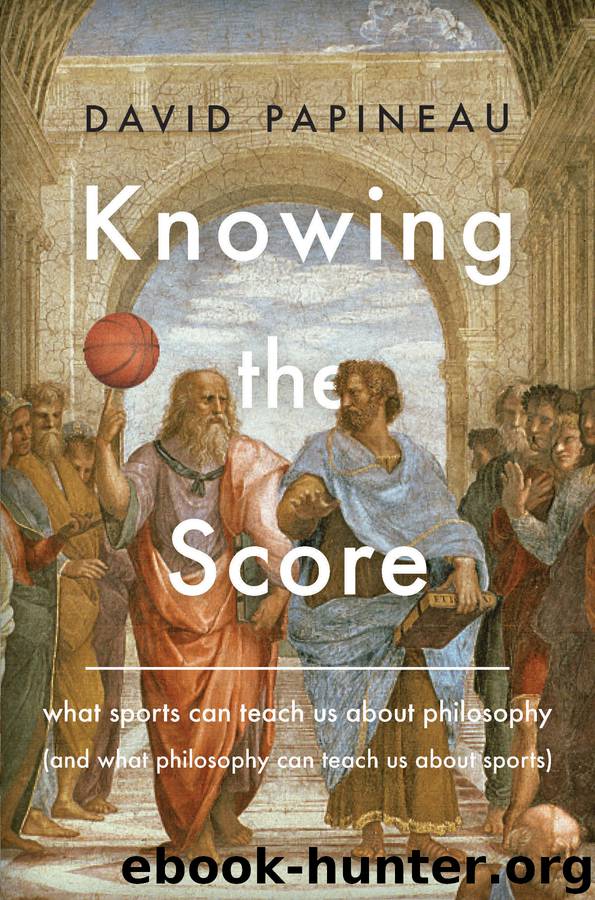Knowing the Score by David Papineau

Author:David Papineau
Language: eng
Format: epub
Publisher: Basic Books
Published: 2017-05-02T04:00:00+00:00
Chapter 12
SPORTING NATIONS AND POLITICAL GEOGRAPHY
ONE OF MY childhood cricket heroes was “Goofy” Lawrence, an honest South African fast bowler who played five test matches in the early 1960s, and should have played more. The funny thing, however, is that Goofy wasn’t South African at all, but a citizen of what is now Zimbabwe and was then Rhodesia, a quite different country, but which in those days was simply annexed by South Africa for cricketing purposes.
When Robert Mugabe’s ZANU-PF party won an overwhelming victory in Zimbabwe’s first independence election in February 1980, the country’s cricketers were perturbed. They asked if this meant they weren’t part of South Africa anymore and would have to stop playing in its domestic Currie Cup competition.
It was an absurd enquiry. The apartheid South African state was then at the height of its international isolation, not to mention that many of the largely white cricket team had been fighting Mugabe in a bloody civil war for the past few years. Mugabe explained to the cricketers that there was no way that they could carry on as before. But then—showing a proper sense of priorities for a lifelong cricket fan—he gave them a special dispensation to play out the last matches of that Currie Cup season.
The historical incorporation of Rhodesia into the South African cricket team isn’t an isolated case. There are a surprising number of sporting countries that aren’t in the United Nations. Sporting nations and political nations don’t always line up together. This mismatch offers a number of insights into the basis of nationhood.
We tend to take political states for granted, assuming that their boundaries were laid down by natural divisions long ago. But in truth many recognized states are arbitrary and relatively recent constructions, shaped by the outcome of diplomatic negotiations, or by the happenstantial location of armies when a truce is declared. Sometimes the arbitrariness of existing states is exposed by sudden realignments, as when the end of the Cold War precipitated the reunification of Germany and the dissolution of the former Yugoslavia. But in other cases the potential for political repositioning remains implicit in sporting affiliations. In this chapter, we will look at a range of national teams that demand loyalty to countries that don’t appear on the official map of nations, from Hong Kong and the West Indies to Ireland and Wales.
Perhaps these sporting allegiances point the way to a more flexible international order for our increasingly globalized age. Healthy political units need their members to think of themselves as engaged in shared projects. But this needn’t demand the familiar division into nation states, with a single governing body wielding legitimate power over any given place on the surface of the earth. There are various other possibilities, including federal structures with nested powers, and even overlapping authorities with differentiated responsibilities. We need only think of how the free trade, monetary, customs, and migration unions in contemporary Europe all involve different sets of countries.
National sporting success can do much to unite a
Download
This site does not store any files on its server. We only index and link to content provided by other sites. Please contact the content providers to delete copyright contents if any and email us, we'll remove relevant links or contents immediately.
The Inner Game of Tennis by W. Timothy Gallwey(3687)
Unstoppable by Maria Sharapova(3525)
Crazy Is My Superpower by A.J. Mendez Brooks(3400)
Urban Outlaw by Magnus Walker(3396)
Mind Fuck by Manna Francis(3194)
The Social Psychology of Inequality by Unknown(3031)
The Fight by Norman Mailer(2941)
Unstoppable: My Life So Far by Maria Sharapova(2503)
Accepted by Pat Patterson(2371)
Going Long by Editors of Runner's World(2362)
Futebol by Alex Bellos(2359)
Backpacker the Complete Guide to Backpacking by Backpacker Magazine(2248)
Sea Survival Handbook by Keith Colwell(2244)
Motorcycle Man by Kristen Ashley(2238)
The Happy Runner by David Roche(2238)
The Sports Gene: Inside the Science of Extraordinary Athletic Performance by David Epstein(2178)
Peak: Secrets from the New Science of Expertise by Anders Ericsson & Robert Pool(2034)
Endure by Alex Hutchinson(2028)
The Call of Everest by Conrad Anker(1909)
